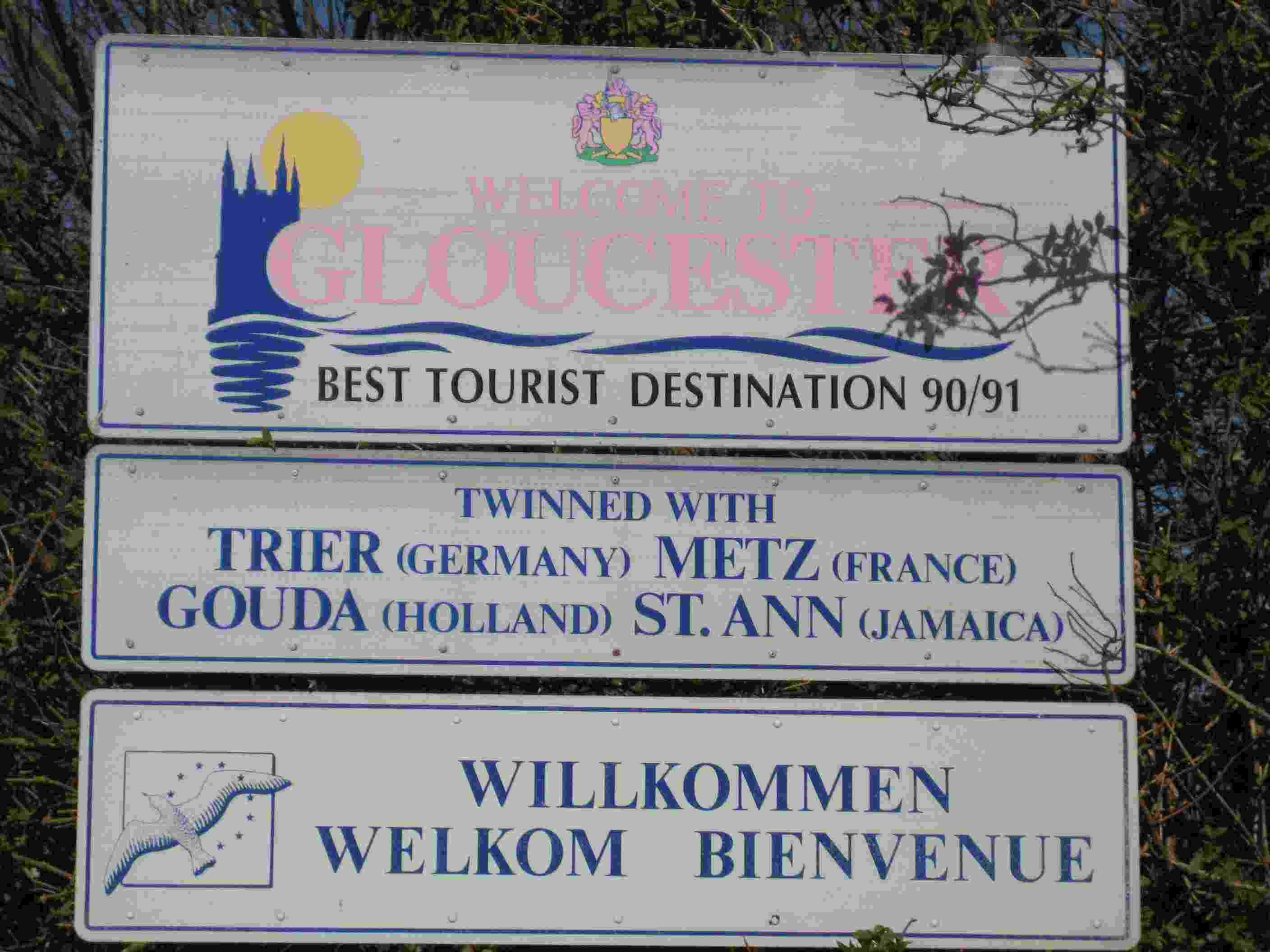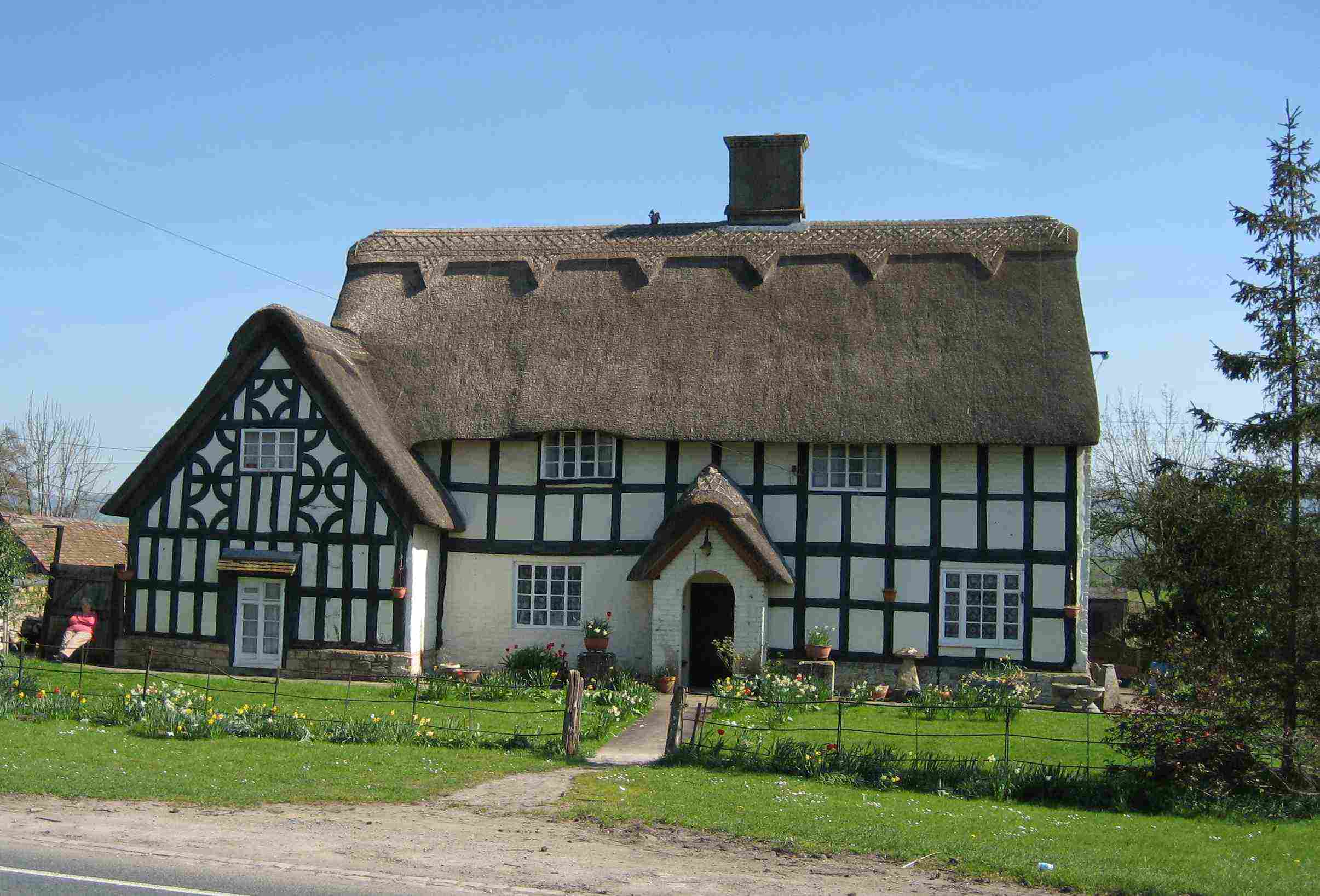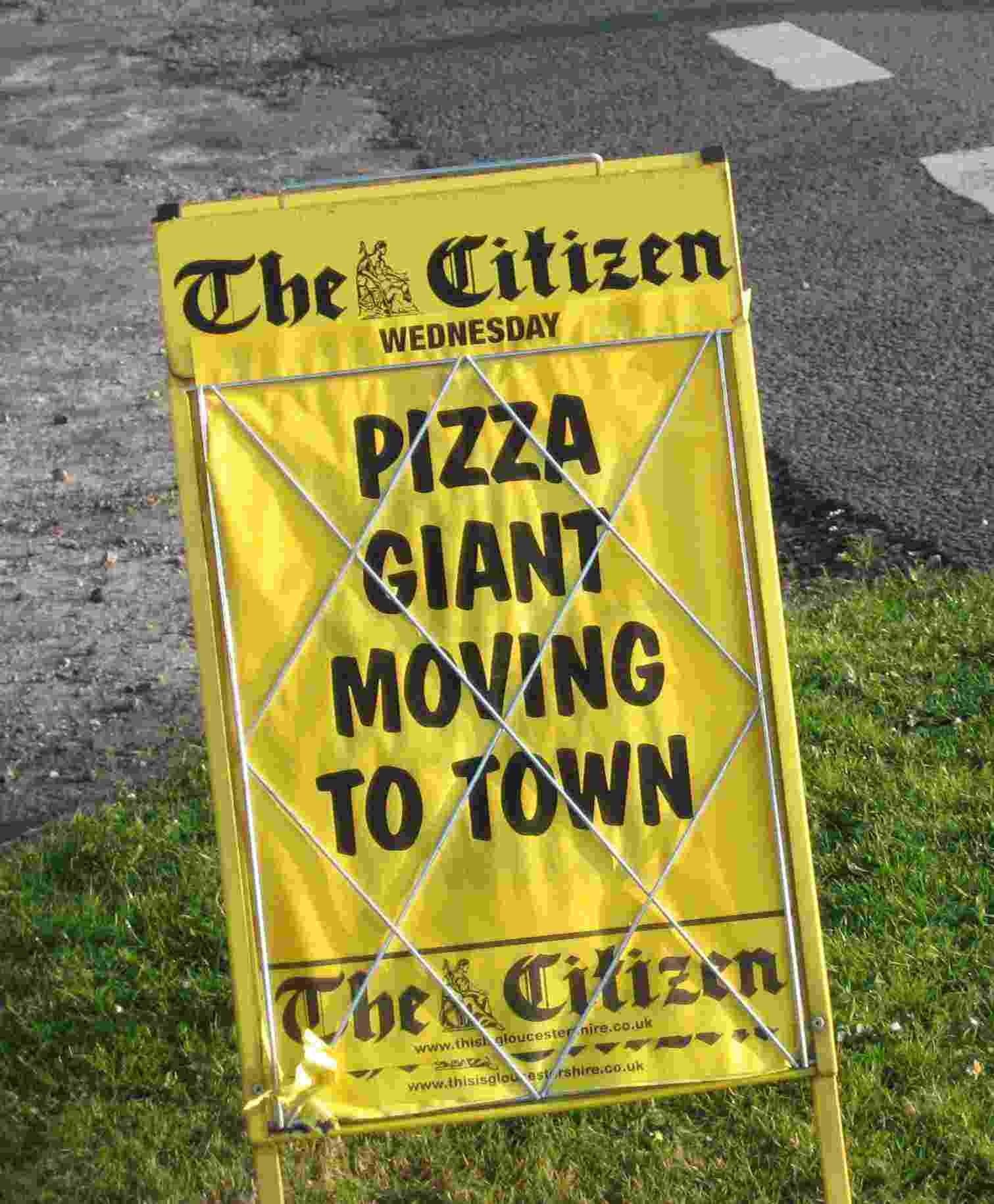 |
|
 |
|
| Days N15 - N24 English Midlands | |
|
Northbound
Home Start hiking here English West Country English Midlands North of England Southern Scotland Central Scotland Scottish Highlands |
Thursday,
April 5, 2007
Time of departure: 8.15 am Time of arrival: 4.45 pm Place departed: Falfield, South Gloucestershire Place arrived: Gloucester, Gloucestershire Miles: 18.3 Cum miles: 267.0 Percent complete: 28.8  The Bristol,
Gloucester - no
stars The Bristol,
Gloucester - no
starsCost for bed and breakfast: £25 ($50) |
| Overview of both
hikes Excerpts Statistics What others say Acknowledgments Contact me Copyright Links |
|
 |
|
| At last, a newspaper that reports what's important | |
| My
breakfast at the Falfield Bristol
Inn
(not to be confused with The
Bristol in Gloucester)
was
a gracious affair, served on white, starched
linen with fancily-folded napkins and upscale silverware. I
like
orange juice because it gives me the liquids I need while hiking and
also the Vitamin C that is pretty well missing in the rest of a
traditional English breakfast; here I could drink my fill of
it.
I decorated my cereal with fresh blackberries, raspberries and
strawberries, and a plum I delicately sliced just so that I could
linger in the luxury as long as possible. Instead of the
ubiquitous fried egg, bacon and sausage, I ordered smoked haddock and
poached eggs, which are something I enjoy perhaps once a
year.
Unlike budget establishments, which serve food on a small but full
plate (to emphasize value), the Bristol Inn serves it on a large plate,
where it occupies only the center, to showcase its quality. Then
I had a croissant with Camembert and Double Gloucester cheeses, washed
down with black coffee. I couldn't then resist an Elm Farm
strawberry yogurt as a kind of breakfast dessert. With my
rather
stylish room, breakfast and accommodation cost £50 ($100) instead
of the posted £80 ($160). A little charm at check-in can make a
big difference. No wonder I gravitated towards a Bristol-named hotel in the city of Gloucester tonight, though as I relate tomorrow, with different results. I set out at my usual 8.15 am having made a change to my boots. By removing the cushion sole inserts, I had a harder "ride" but more room for my toes. I was pretty sure this would help with my blisters. With my feet feeling better almost immediately, I decided to stride out a little more, on the basis that it might be a good trade to exert myself more, and then stop earlier in the day. I think this plan worked, but it needed testing over several days to be sure. As I left Falfield, I departed South Gloucestershire and entered Gloucestershire, according to a road sign. But I've discovered that county lines are not what they used to be. There were once 86 counties in Britain, and local government was structured according to their boundaries. By and large, this didn't change for nearly a hundred years. Then, in the interests of efficiency, many local government boundaries shifted. New counties were formed in many areas, and one of them - called Avon - took in the city of Bristol that was formerly in Gloucestershire. Then, not many years later, Avon was abolished, and Bristol became a county in itself while the area immediately north (encompassing Falfield) became another county, that of South Gloucestershire, while Gloucestershire itself lay just north of that. Bristolians and many others have therefore lived in three counties in one generation and, just for good measure, their postal address may not even correspond to the county they live in. If that sounds confusing, it's because it is. These changes to improve on governmental efficiency have spawned a new bureaucrasy to reconcile past governmental areas with the new ones. This is more than a matter of just crafting a new map - it affects everything from dog license records to census results, so that past records and future statistical analysis can conform with the county de jour. Yes, as I write, there are people dissecting the marriage, birth and death records of one county to assign them according to the latest county definitions. And even when the records aren't actually dissected, the facts as to where these records are kept is itself the subject of record-keeping. If you once lived in Avon and want a copy of a certain county record, do you ask in South Gloucestershire or Bristol? This may not sound like much more than bureaucratic shuffling. But that's not what the country's bird watchers think. "How," they've written, "are we to accurately report where we've sighted a corncrake when we don't know what county to mention? A plaintiff letter to Birdforum asks: "Does anyone know why the birding border is nothing like the official county border of Norfolk/Suffolk?" Some people are aiming for a global solution to problems like this, among them The Association of British Counties (ABC). This society is . . . ".
. . dedicated to promoting awareness of the continuing importance of
the 86 historic (or traditional) Counties of Great Britain. ABC
believes that the Counties are an important part of the history,
geography and cultural life of Great Britain. ABC contends that Britain
needs a fixed popular geography, one divorced from the ever changing
names and areas of local government but, instead, one rooted in
history, public understanding and commonly held notions of cultural
identity. ABC, therefore, seeks to fully re-establish the use of the
Counties as the standard popular geographical reference frame of
Britain and to further encourage their use as a basis for social,
sporting and cultural activities".
If you think this is a knee-jerk reaction to imagined government slights, their website tells otherwise. The structure of and changes to local government have gotten exceedingly complicated, and threaten to drag some proud county cultures with them into a blurred, bureaucratic morass. All that ABC wants to do is to keep the old counties for most everything, leaving governmental boundaries just for government. And, you know, I have gotten old enough to support them. When Surrey plays Kent at cricket, I like the counties the way they were when Peter May and Colin Cowdrey were around. I needed fewer rests in the morning than I did in the afternoon. To understand this better, I should explain that I have two types of rest - pack-on, and pack-off. A pack-on rest is a pretty crummy rest, actually more like a pause, because it involves finding a high-ish wall, or large trash can or mail box. On this, I lower my pack while still standing, often in a slouch to allow the wall or other object to take the pack weight off my shoulders. (A sitting-down, pack-on rest is almost impossible without a very deep bench seat, and there are few road or trailside benches of any size, I was finding. Or it involves a grassy bank, which is a poor alternative since they’re often wet or covered in nettles.) A pack-off rest is by far the better of the two, but it's more of a deal to get the thing off and on with all its straps. A pack-off rest is enjoyed more rarely and when there's somewhere decent to sit. In the morning I probably took about three pack-on pauses, and one pack-off rest. In the afternoon, I took perhaps twice this number. I wanted to get to Gloucester today, because it was the next day (Good Friday) that I wanted to start trekking on the Severn Way and get off main roads during the crowded Easter holiday break. The Severn is one of Britain's major rivers, though only navigable above about Gloucester by pleasure boats, and its route to the sea runs broadly north-south with a well-known trail alongside it. So, stepping out as I did, I managed to reach Gloucester in two days from Bristol, ready to start on the Severn Way in the morn. The Severn is a tidal, ocean-navigable estuary below Bristol. Between Bristol and Gloucester, the tidal and commercial influences subside as estuary turns to river at a place called Awre. Upriver from Gloucester, it’s a peaceful, scenic and recreational river. But upriver from Awre for the 20 miles to Gloucester, and sometimes even beyond, it exhibits a striking phenomenon known as the Severn Bore. This is, in fact, one of Britain’s more renowned natural phenomena. The Severn Bore is a tidal matter – the Severn estuary having a massive up-to-50-ft tidal range and containing an enormous volume of water (and thus, by the way, being an obvious candidate for a tidal barrier to generate power). At the right conditions, a wave is formed as a high incoming tide is funneled into the narrowing river. The wave then barrels upriver against the current at a speed faster than one can run, ridden by surfers and followed by pleasure boats. About five-ft high, the wave is accompanied by a roaring sound. The water level remains high for another 90 minutes or so. I had researched the predicted times for the bore, which occurs three to five times a month. Unfortunately, there was a gap in occurrences when I was in the area, which would have caused an, err, boring wait of ten days for the next one. And so I arrived in Gloucester, eager as always to find my accommodation. I had a place in mind on Bristol Road, and called and confirmed availability. Arriving then on Bristol Road, and finding the right address but no accommodation, I called again. The landlady proved to be too clueless to help me with directions, beyond “Can you see me in the yard?” Later, I deduced that I might have been on Bristol Road in the suburb of Quedgeley, and not quite in Gloucester itself. The same road in the same urban area just started a new set of street numbers, logical enough if you live there or deliver mail. You would have thought that someone who must constantly give directions to her customers would have figured that out. So, giving up on her, I was pleased to find another Bristol hotel, hopefully as good as last night’s. Hope springs eternal, but was not reality. The Bristol in Gloucester is not in the same class as the Bristol Inn in Falfield, but when I checked-in, I thought it would suit well enough. For dinner, I found a café. In fact, I’ll call it a cafe (no accent on the e), which is what the British traditionally call a down-to-earth café serving the food that I’m about to describe. When I lived in England, a cafe served basic fare like meat and potato with greens and gravy, and fried egg with ham and peas, and battered frozen fish with chips and gravy. Each dish had at least some fried ingredients, and, if not, had been cooked earlier and was then re-heated. That is, unless it was Welsh rarebit or beans on toast, which would be freshly prepared. This fare was not gourmet, but in those days it was generally edible and cheap. Here in Gloucester, as elsewhere, cafes are no longer cheap. A cafe meal costs £8 ($16) or so. But I expected an improvement in quality from the past. The British do meat pies well, through long experience of devising meat dishes without a lot of meat. In Gloucester today, the meat pie had a gristly piece of meat, and a fatty piece, neither of them edible, and a lot of potato and fatty liquid. With the pie came chips, a congealed mass of them, suppurating through cold and lumpy gravy. The Brussels sprouts, usually a favorite, were yellow from overcooking, and hardly recognizable now that they were pulp. The tomato ketchup squeeze bottle was grimy and its contents tasted alcoholic through age, or was off, or both. I’m sure there are good cafes, but this wasn’t one of them. I decided that I had found the English restaurant that no self-respecting dog will go into – for more on this, please see day N11. |
|
| Day N15 © 2007 and 2008 Daryl May Day N17 | |